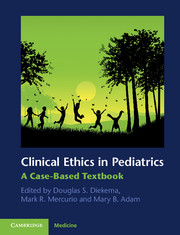Book contents
- Frontmatter
- Contents
- Contributors
- Preface
- Section 1 Core issues in clinical pediatric ethics
- Pediatric decision-making: informed consent, parental permission, and child assent
- 2 Pediatric decision-making: adolescent patients
- 3 Parental refusals of recommended medical interventions
- 4 Adolescent confidentiality
- 5 Refusals of treatment in adolescents and young adults
- 6 Family beliefs and the medical care of children
- 7 Fidelity and truthfulness in the pediatric setting: withholding information from children and adolescents
- 8 Fidelity and truthfulness: disclosure of errors
- 9 Requests for “non-therapeutic” interventions in children: male circumcision
- Section 2 Ethical issues at the beginning of life: perinatology and neonatology
- Section 3 When a child dies: ethical issues at the end of life
- Section 4 Ethical issues posed by advances in medical technology and science
- Section 5 Children, public health, and justice
- Section 6 Special topics in pediatric ethics
- Index
- References
Pediatric decision-making: informed consent, parental permission, and child assent
from Section 1 - Core issues in clinical pediatric ethics
Published online by Cambridge University Press: 07 October 2011
- Frontmatter
- Contents
- Contributors
- Preface
- Section 1 Core issues in clinical pediatric ethics
- Pediatric decision-making: informed consent, parental permission, and child assent
- 2 Pediatric decision-making: adolescent patients
- 3 Parental refusals of recommended medical interventions
- 4 Adolescent confidentiality
- 5 Refusals of treatment in adolescents and young adults
- 6 Family beliefs and the medical care of children
- 7 Fidelity and truthfulness in the pediatric setting: withholding information from children and adolescents
- 8 Fidelity and truthfulness: disclosure of errors
- 9 Requests for “non-therapeutic” interventions in children: male circumcision
- Section 2 Ethical issues at the beginning of life: perinatology and neonatology
- Section 3 When a child dies: ethical issues at the end of life
- Section 4 Ethical issues posed by advances in medical technology and science
- Section 5 Children, public health, and justice
- Section 6 Special topics in pediatric ethics
- Index
- References
Summary
Case narrative
Osteosarcoma is a highly malignant bone cancer with a predilection for spreading to the lungs that primarily affects adolescents. Non-metastatic osteosarcoma has an approximate cure rate of 70%. Patients with osteosarcoma and metastases at the time of diagnosis are cured less than 20% of the time. Treatment consists of surgery and chemotherapy. Many children with cancer are treated according to clinical research trials.
Michael, a 15-year-old with metastatic osteosarcoma, has not responded to conventional therapy. For almost one year, he was treated on a therapeutic randomized clinical trial, which consisted of standard therapy (up-front chemotherapy, limb salvage surgery, and postsurgical chemotherapy). When his cancer responded poorly to up-front therapy he was randomized to receive additional “experimental” chemotherapy.
- Type
- Chapter
- Information
- Clinical Ethics in PediatricsA Case-Based Textbook, pp. 1 - 6Publisher: Cambridge University PressPrint publication year: 2011
References
- 5
- Cited by

